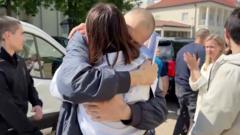In a surprising turn of events, Sergei Tikhanovsky, the husband of Belarusian opposition figure Svetlana Tikhanovskaya, has been released from prison after five years. Along with 13 fellow political prisoners, he was moved to Lithuania, where he joyfully reunited with Tikhanovskaya, who has been living in exile since the political crackdown in Belarus began. Tikhanovskaya shared a heartfelt video of their reunion, expressing that words could hardly describe her joy.
The timing of this unexpected release coincides with a visit from U.S. special envoy Keith Kellogg to Belarus’ capital, Minsk, where discussions were held with authoritarian leader Alexander Lukashenko. Lithuania’s foreign ministers confirmed that multiple detainees have received care in Lithuania, highlighting Tikhanovsky's release as the most prominent case. A notable figure in Belarus politics, Tikhanovsky had previously rallied against Lukashenko's regime, risking imprisonment by engaging directly with citizens across the country.
Arrested in 2020 while launching a campaign against Lukashenko’s re-election, Tikhanovsky was sentenced to 18 years in prison in 2021 on charges relating to protest organization. This judicial action was widely deemed a response to the massive protests against perceived electoral fraud in the 2020 elections. Following Tikhanovsky’s arrest, his wife, Tikhanovskaya, assumed the role of the opposition leader, further escalating the public outcry against Lukashenko, who has been in power since 1994.
While the release of Tikhanovsky is seen as a significant move, other key opposition figures remain imprisoned, such as Maria Kolesnikova. Although Tikhanovskaya acknowledged the progress, she emphasized that more releases are necessary, noting that 1,150 political prisoners are still incarcerated. This incident casts a spotlight on the ongoing political oppression in Belarus, where dissent continues to be met with severe repercussions.
Senior advisers around Tikhanovskaya suggested that Tikhanovsky’s release signals a willingness from Lukashenko to mend relations with the West, especially given the context of the recent geopolitical climate. Some analysts believe this could lead to potential discussions regarding sanctions, marking a diplomatic shift for the Belarusian leader after years of isolation due to his controversial governance.
Despite this release, reports indicate continued repression in Belarus, as many activists face intimidation and potential imprisonment for opposing the government. Tikhanovsky’s unexpected return to the political landscape complicates the dynamics among opposition groups, potentially reshaping the paths they may follow in their continued fight for democracy.
The developments have instigated both hope and uncertainty within Belarus, as citizens yearn for more substantial reforms while remaining aware of the risks associated with dissent. Hundreds of thousands of citizens have fled the country amidst the violent crackdown on dissent over the past five years, leaving the future of Belarus’ political landscape in a precarious balance.
The timing of this unexpected release coincides with a visit from U.S. special envoy Keith Kellogg to Belarus’ capital, Minsk, where discussions were held with authoritarian leader Alexander Lukashenko. Lithuania’s foreign ministers confirmed that multiple detainees have received care in Lithuania, highlighting Tikhanovsky's release as the most prominent case. A notable figure in Belarus politics, Tikhanovsky had previously rallied against Lukashenko's regime, risking imprisonment by engaging directly with citizens across the country.
Arrested in 2020 while launching a campaign against Lukashenko’s re-election, Tikhanovsky was sentenced to 18 years in prison in 2021 on charges relating to protest organization. This judicial action was widely deemed a response to the massive protests against perceived electoral fraud in the 2020 elections. Following Tikhanovsky’s arrest, his wife, Tikhanovskaya, assumed the role of the opposition leader, further escalating the public outcry against Lukashenko, who has been in power since 1994.
While the release of Tikhanovsky is seen as a significant move, other key opposition figures remain imprisoned, such as Maria Kolesnikova. Although Tikhanovskaya acknowledged the progress, she emphasized that more releases are necessary, noting that 1,150 political prisoners are still incarcerated. This incident casts a spotlight on the ongoing political oppression in Belarus, where dissent continues to be met with severe repercussions.
Senior advisers around Tikhanovskaya suggested that Tikhanovsky’s release signals a willingness from Lukashenko to mend relations with the West, especially given the context of the recent geopolitical climate. Some analysts believe this could lead to potential discussions regarding sanctions, marking a diplomatic shift for the Belarusian leader after years of isolation due to his controversial governance.
Despite this release, reports indicate continued repression in Belarus, as many activists face intimidation and potential imprisonment for opposing the government. Tikhanovsky’s unexpected return to the political landscape complicates the dynamics among opposition groups, potentially reshaping the paths they may follow in their continued fight for democracy.
The developments have instigated both hope and uncertainty within Belarus, as citizens yearn for more substantial reforms while remaining aware of the risks associated with dissent. Hundreds of thousands of citizens have fled the country amidst the violent crackdown on dissent over the past five years, leaving the future of Belarus’ political landscape in a precarious balance.



















